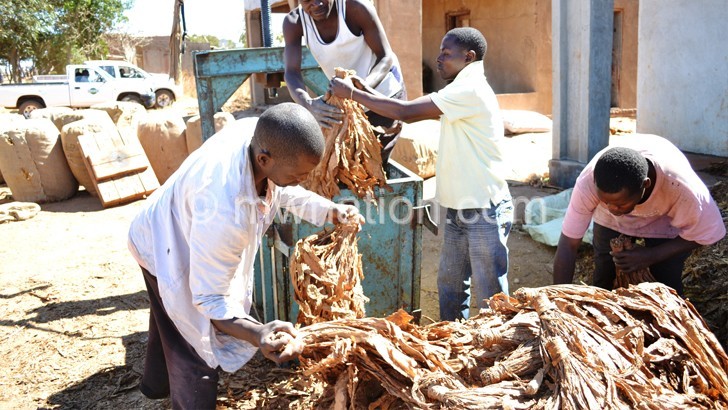Subdued tobacco market will impact on trade—RBM
The Reserve Bank of Malawi (RBM) says the subdued performance of the 2019 tobacco market will negatively impact the country’s Terms of Trade (TOT).
According to RBM figures, the performance of tobacco prices during the 2018/19 season has been unsatisfactory compared to the previous two seasons with average prices for tobacco, at $1.43 (about K1 060) per kilogramme (kg) for 2019 lower than $1.67 (about K1 236) per kg fetched in 2018 and $2 (about K1 480) per kg in 2017.

The lower prices in 2019 have been attributed to over production.
As a consequence, RBM assumes TOT—the ratio of export prices to import prices-growth to be around neutral position in the ‘forecast horizon’.
“If the price of exports goes down, you would expect TOT to go down too, all things being equal. If it were not for the fall in tobacco prices, our terms of trade would have improved. If it had worsened then trade deficit would have increased,” said RBM spokesperson Mbane Ngwira.
Tobacco, which accounts for 53 percent of the country’s foreign earning, saw its earnings in the 2018/19 marketing season at auction floors level, declined to about $237 million (about K180 billion) as compared to $337.5 million (about K256 billion) realised in the 2017/18 marketing.
The development also comes at a time when the United States of America (USA), which is ranked the world’s second biggest importer of tobacco after Brazil, imposed a ‘ban’ on Malawi’s export of all tobacco and tobacco products into that country for alleged forced labour and child labour practices.
The decision by the US Government puts at stake about 8 million kg of Malawi tobacco destined to the US every year, valued at $29 million (about K22 billion) per annum, based on the past six-year average.
This followed a US Customs and Border Protection (CBP) issueance of a Withhold Release Order (WRO) on tobacco from Malawi last Friday, allowing it to detain imported goods believed to have been produced with forced labour, according to a CNN report last week.
In 2017, for example, Malawi earned an estimated value of $532 million (about K404 billion) from tobacco and manufactured tobacco substitutes, according to the statistics by the Ministry of Industry, Trade and Tourism.
Already, Treasury had projected Malawi’s trade balance—the difference between the value of a country’s imports and its exports— was projected to worsen by 16.4 percent this year to $1.42 billion (about K1 trillion) from $1.31 billion (about K 970 billion) last year due to a fall in values of traditional export products that was anticipated to go down in 2019.
Chancellor College economics professor Ben Kaluwa earlier argued that unless Malawi produce and trade in goods that have gone through value addition, it will be difficult to reduce the trade deficit.
Ministry of Industry, Trade and Tourism spokesperson Mayeso Msokera said the country’s main focus now is to build the export readiness of Malawian exporters and develop regional and global value chains, promoting entrepreneurship with emphasis on micro, small and medium enterprises and women and youth entrepreneurs as well as addressing critical enablers and cross-cutting issues related to exports such as energy, transport, market intelligence and trade facilitation.
Malawi’s exports continue to be dominated largely by semi-processed tobacco, with the sub-sector alone accounting for nearly half of total exports during the period 2011-2015.





